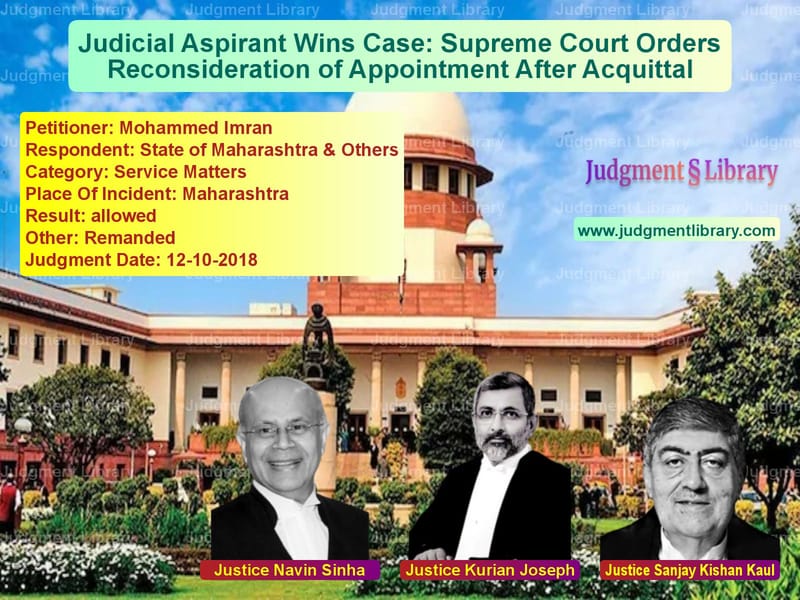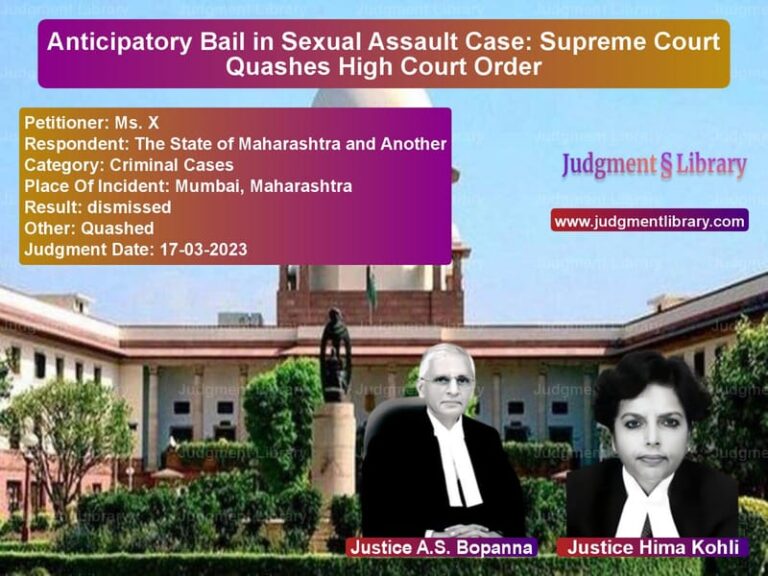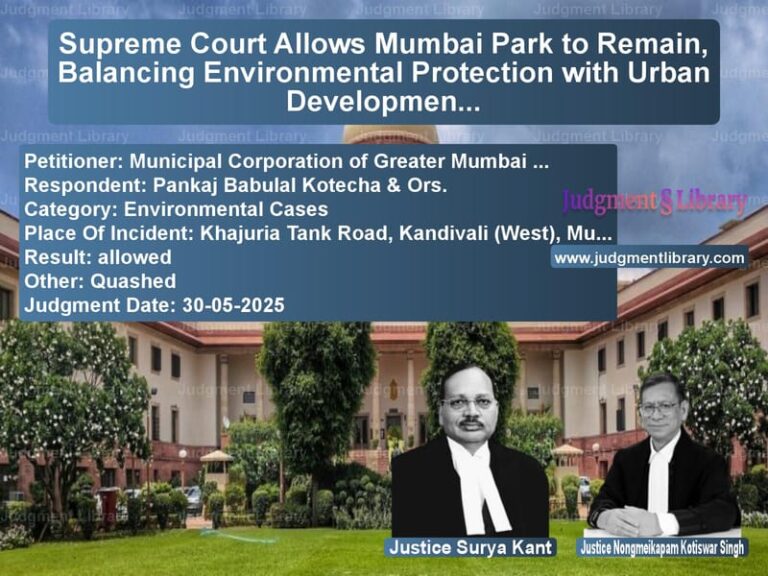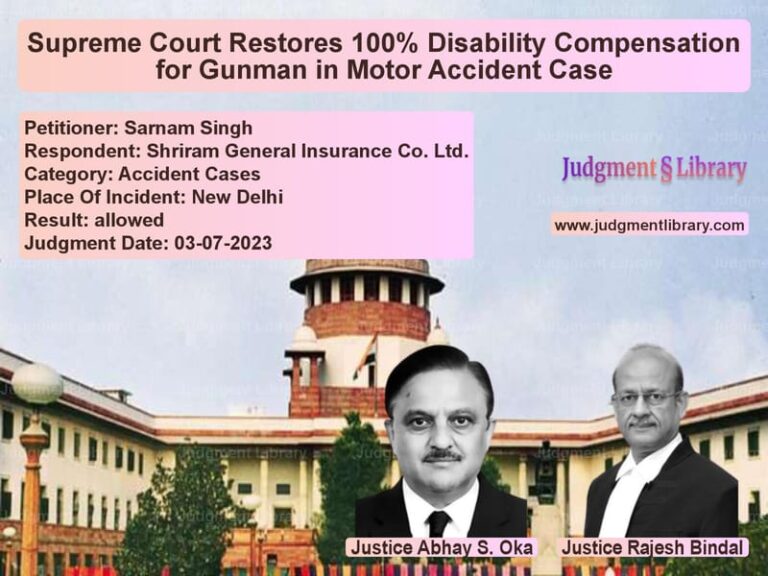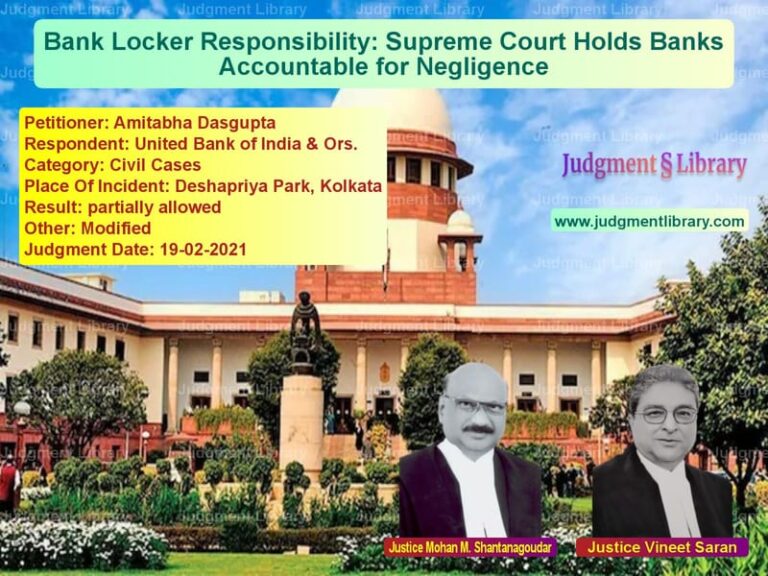Judicial Aspirant Wins Case: Supreme Court Orders Reconsideration of Appointment After Acquittal
The Supreme Court of India, in its judgment in Mohammed Imran vs. State of Maharashtra & Ors., addressed the rejection of a judicial service aspirant’s selection due to a past criminal case, despite his acquittal. The ruling highlighted the importance of fairness in character assessment for government appointments and underscored the principle that past allegations without conviction should not be an absolute bar to employment.
Background of the Case
The appellant, Mohammed Imran, successfully cleared the judicial service examination in Maharashtra in 2009 and was recommended for appointment by the Maharashtra Public Service Commission. However, his selection was later canceled on June 4, 2010, following a character verification report from the police. The rejection was based on his prior involvement in a criminal case under Sections 363, 366, and 34 of the Indian Penal Code (IPC). Imran had been acquitted of all charges on October 28, 2004, well before appearing for the examination.
Key Legal Issues
- Whether the rejection of Imran’s selection based on a past criminal case, despite acquittal, was legally valid.
- Whether involvement in a criminal case constitutes ‘moral turpitude’ that disqualifies a candidate from judicial service.
- Whether denying appointment under these circumstances violates Article 14 (Right to Equality) of the Constitution.
Arguments by the Appellant
The appellant, represented by Senior Advocate Huzefa Ahmadi, contended:
- He had truthfully disclosed his prosecution and acquittal in his application form.
- His only alleged role in the case was that he was traveling in an auto-rickshaw behind the main accused, who was charged with abduction.
- The prosecution in the original case collapsed as the alleged victim turned hostile.
- Another candidate, Sudhir Gulabrao Barde, who was acquitted in a different case involving IPC Sections 294, 504, and 34, had been appointed, demonstrating discriminatory treatment.
Arguments by the Respondents
The State of Maharashtra defended its decision, arguing:
- The appellant’s involvement in the case, though he was acquitted, was sufficient to raise concerns about his moral integrity.
- The judicial service demands a higher standard of moral conduct compared to other government jobs.
- Merely being recommended for appointment does not create an absolute right to employment.
Supreme Court’s Observations
The Supreme Court noted the importance of considering the nature of the allegations and the reasons for acquittal before branding someone as unfit for public service. The Court ruled:
“Judicial service is different from other services, and higher standards of behavior and conduct are expected. However, moral turpitude cannot be a mechanical or rhetorical ground to deny employment.”
Key Findings
- The appellant’s role in the original criminal case was marginal, and he had been acquitted.
- The rejection of his selection was arbitrary, especially since another similarly placed candidate had been appointed.
- Employment decisions must be based on fairness and a proper assessment of an individual’s overall character and conduct.
- Past mistakes should not be an “albatross around the neck” if a person has reformed and demonstrated good behavior.
Final Judgment
The Supreme Court ordered the Maharashtra Government to reconsider Imran’s candidature, stating:
“In the entirety of the facts and circumstances, we find the rejection of the appellant’s selection to be afflicted by a myopic vision, clouded by an unreasoned application of moral turpitude. His character and antecedents, as confirmed by police reports, show no adverse material against him.”
The Court directed the State to complete the reconsideration process within eight weeks. However, it clarified that in case of appointment, Imran would not be entitled to retrospective seniority or back pay.
Impact of the Judgment
- This ruling sets a precedent that acquittals should not be ignored in government service selection.
- It establishes that denying employment solely based on past allegations, without considering reformation, is unjust.
- The judgment reinforces the principle of fair and equal treatment in employment decisions.
By directing a reconsideration rather than outright appointment, the Supreme Court balanced fairness with administrative discretion, ensuring that past accusations do not permanently hinder career prospects.
Petitioner Name: Mohammed Imran.Respondent Name: State of Maharashtra & Others.Judgment By: Justice Navin Sinha, Justice Kurian Joseph, Justice Sanjay Kishan Kaul.Place Of Incident: Maharashtra.Judgment Date: 12-10-2018.
Don’t miss out on the full details! Download the complete judgment in PDF format below and gain valuable insights instantly!
Download Judgment: Mohammed Imran vs State of Maharashtra Supreme Court of India Judgment Dated 12-10-2018.pdf
Direct Downlaod Judgment: Direct downlaod this Judgment
See all petitions in Employment Disputes
See all petitions in Recruitment Policies
See all petitions in Public Sector Employees
See all petitions in Judgment by Navin Sinha
See all petitions in Judgment by Kurian Joseph
See all petitions in Judgment by Sanjay Kishan Kaul
See all petitions in allowed
See all petitions in Remanded
See all petitions in supreme court of India judgments October 2018
See all petitions in 2018 judgments
See all posts in Service Matters Category
See all allowed petitions in Service Matters Category
See all Dismissed petitions in Service Matters Category
See all partially allowed petitions in Service Matters Category

